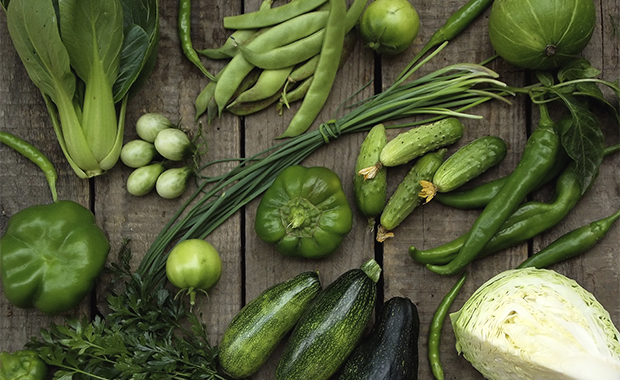
You've made it through the winter and it's time to shed some maybe unhealthy eating habits that came along with the season. The great news is that more fresh, seasonal foods are coming our way and there is no better time to start making some nutrition changes. A great area to turn is to those great greens that are at the top of dietitians’ go-to lists.
We know green foods are super healthy. But do you know why? Dark green plant foods are rich in carotenoids such as lutein that may improve your eye health, strengthen your immune system, and even reduce your risk of chronic diseases including cancer and heart disease.
Luckily, if you’re not into the typical green foods like broccoli, kale, and Brussels sprouts (which are all still incredibly healthy, by the way), there are plenty of other green options out there, including greens powder. And they come with some pretty surprising benefits.
Read on to find out the five green superfoods you should add to your plate—plus the easy, tasty smoothie recipes that’ll help you score all of their nutrients.
1. Green Tea
Stressed out? Drink green tea. Want to improve your heart health? Drink green tea. Seriously. Green tea leaves contain various antioxidants including epigallocatechin gallate (EGCG), one of the most powerful known free-radical fighters.
“The antioxidants in green tea protect the body’s cells from the damaging effects of oxidative stress that occur during infections, aging, and chronic disease,” says Suzette Pereira, PhD, a research fellow with Abbott. “In addition, EGCG is well known to fight inflammation. Lowering inflammation can reduce the risk of developing chronic diseases such as cancer, heart disease, diabetes, and Alzheimer’s disease.”
And a 2015 study published in The Journal of Frailty & Aging suggests that EGCG reduces the risk of sarcopenia, the gradual loss of muscle mass experienced during the aging process.
2. Spirulina
Spiru-what? Spirulina is—stay with us here—a blue-green algae that nutritionists love for its concentrated levels of nutrients including iron, copper, and protein, says Pamela Nisevich Bede, MS, RD, sports dietitian with Abbott.
A single one-tablespoon serving contains only 20 calories—and about 80 percent of those calories come from protein, making it a good choice for those looking to maintain both muscle and metabolic health. Plus, since it contains all nine of the essential amino acids, which is rare among plant-based proteins, spirulina can be helpful to anyone reducing or eliminating their intake of meat, eggs or dairy. Not sure how to eat spirulina? Try buying it in flake or powder form, adding it to a smoothie or sprinkling it on top of your favorite snacks like popcorn.
3. Kiwi
One single kiwifruit contains more than 100 percent of your daily recommended intake of vitamin C, which performs multiple vital roles in the body. Apart from acting as an antioxidant to fight free-radical damage and inflammation, it helps maintain the health of your bones, heals wounds, and aids in the body’s absorption of iron for energy. What’s more, kiwi is rich in lutein and zeaxanthin, two carotenoids that are important for eye health, says Carolyn Alish, PhD, RD, a registered dietitian and research scientist with Abbott.
4. Edamame
These soybean pods are a staple in China, Japan and Korea, and are quickly gaining popularity on American menus—and for good reason. One cup of soybeans contains about 17 grams of complete protein, meaning these little green gems contain all of the nine essential amino acids your body needs.
Making sure you get enough protein every day is vital to maintaining the health of your muscles, bone, and skin, Alish says. Isoflavones, compounds contained in soy, may also protect women’s fertility, according to 2016 research in the Journal of Clinical Endocrinology & Metabolism. That’s in addition to reducing the risk of heart disease, osteoporosis, and cognitive decline in older adults.
5. Spinach
No, we’re not talking about the slimy mush your mom fed you when you were a kid. Now almost every supermarket under the sun carries fresh, crisp spinach that can make every salad, pasta dish, and smoothie taste both amazing and incredibly fresh. Spinach is rich in calcium, fiber, iron, potassium, vitamin A, vitamin B6, and vitamin C.
According to the U.S. Department of Agriculture, eating just two to three servings of leafy greens like spinach per week can lower your risk of developing stomach, breast, and skin cancer.

Connect with us on Twitter, Facebook, Instagram or Pinterest for more tips, recipes and ideas to fuel your ACTIVE life.
 Find more healthy recipes.
Find more healthy recipes.


